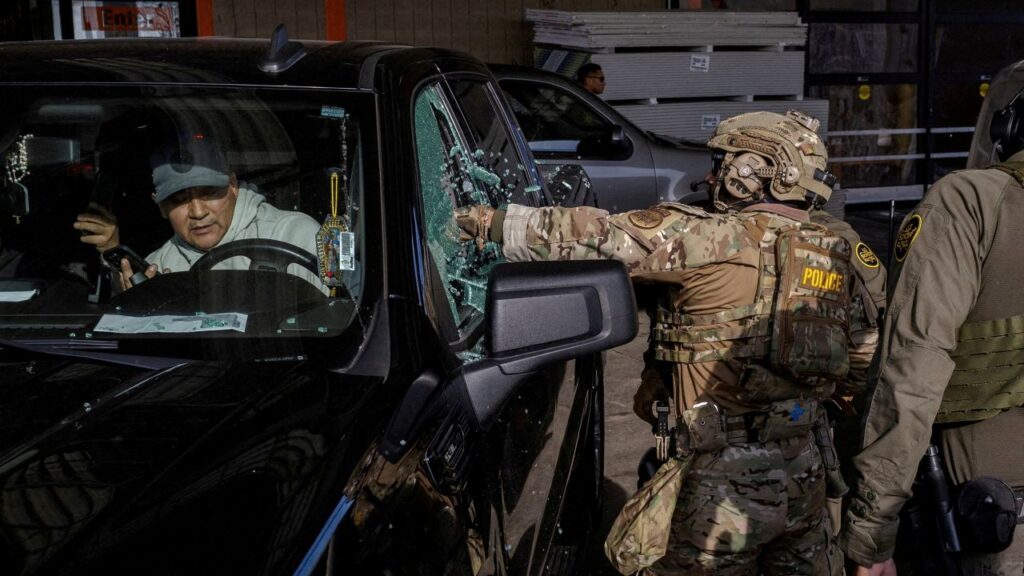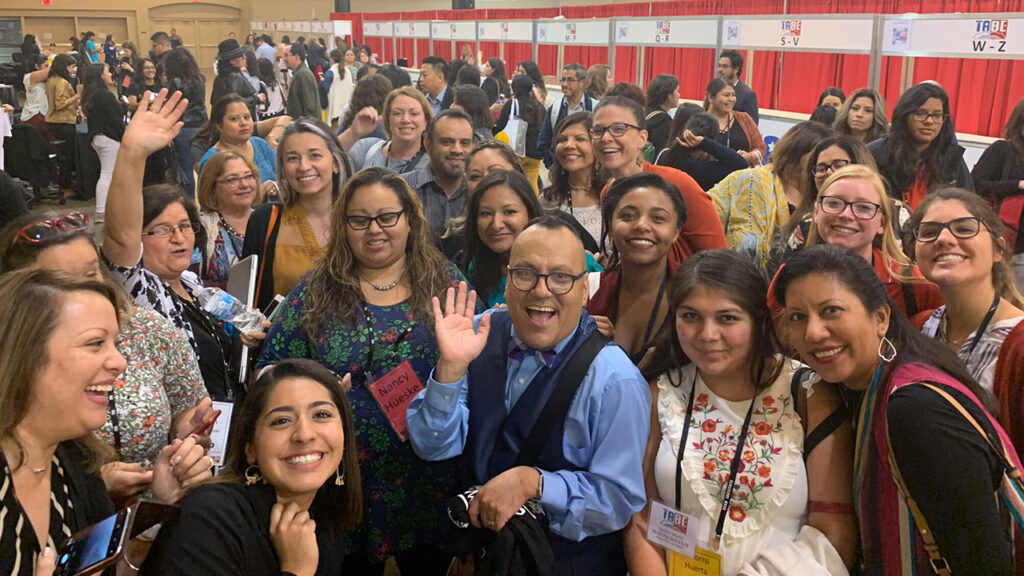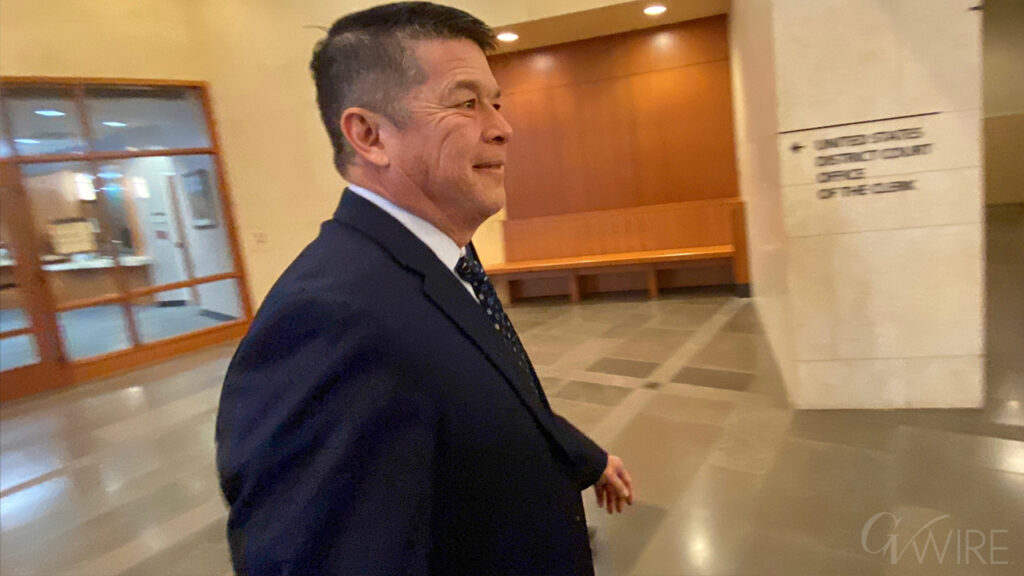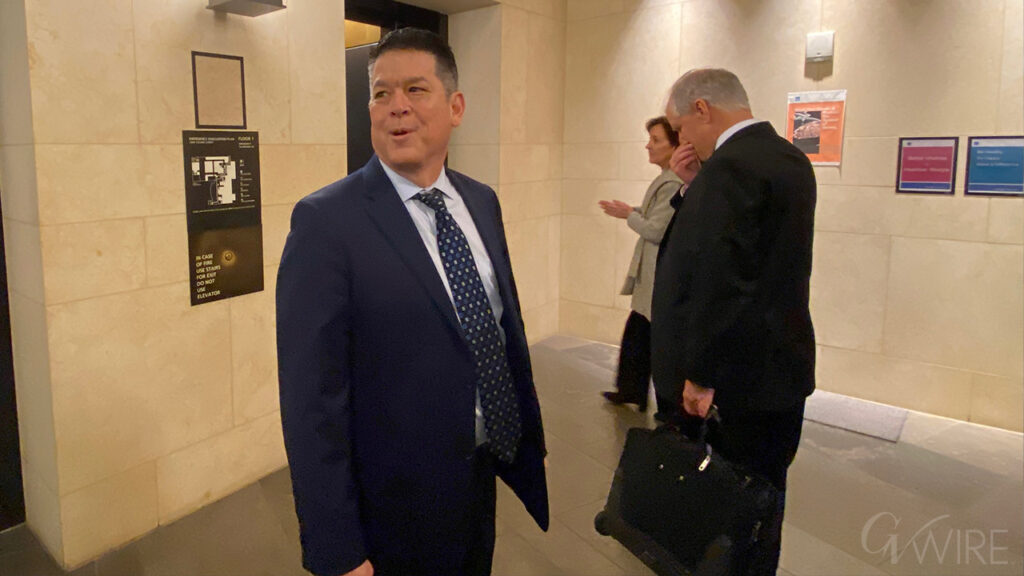A tow truck removes an RV owned by Wayne Gardiner, 58, for more than 20 years during a sweep at Columbus Park, San Jose’s largest homeless encampment, on Aug. 25, 2025. (CalMatters/Florence Middleton)

- California cities ramp up enforcement against people who live in cars and vans.
- Assembly Bill 630 would make it easier for certain cities to dispose of RVs parked on their streets.
- San Francisco is set to enforce its new RV parking rules this fall. Like San Jose, it plans to pay people to give up their RVs.
Share
|
Getting your Trinity Audio player ready...
|
This story was originally published by CalMatters. Sign up for their newsletters.
For months, cities around the state have ramped up enforcement against people sleeping in tents on the street. Now, some are focusing on a new target: People who live in vehicles.
Wayne Gardiner, 58, watched his home of 20 years roll onto the back of a flatbed tow truck in San Jose on a recent Monday afternoon. Then he realized he’d forgotten something inside.
He threw open compartments in the bottom of the RV as fast as he could, looking for the pressure-washing tools he uses for cleaning jobs to make extra money. As the RV rose up onto the truck, about to head off to a junk yard, Gardiner found the black backpack full of tools and pulled it out.
Then he stood back with his rottweiler, Buddy, and some of his possessions in green trash bags at his feet, and watched the truck drive away. He held his emotions in check.
“If I get myself involved with that, I’ll be a wreck,” Gardiner said. “I gotta let it go.”
San Jose is towing vehicles from different areas of the city in a new effort to rid the streets of lived-in vehicles. Last month, it started clearing its largest homeless encampment – a makeshift city in Columbus Park, where Gardiner and hundreds of other people had been sleeping in cars, RVs and tents.
San Francisco passed a new policy this summer banning large vehicles from parking on any city street for more than two hours — effectively making it illegal to live in an RV on the street.
Even smaller cities, including Carlsbad outside of San Diego, and San Mateo in the Bay Area, have adopted new policies targeting people living in cars and RVs.
Assembly Bill 630 Would Make It Easier to Tow RVs
The issue has attracted the attention of state legislators as well. Assembly Bill 630, which cleared another legislative hurdle Friday, would make it easier for certain cities to dispose of RVs parked on their streets.
“We have stories from people who have inoperable RVs that are parked in their neighborhoods, under freeways, that they know are ground-zero for drugs, for prostitution rings, for other criminal activities that are happening there,” said the bill’s author, Assemblymember Mark Gonzalez, a Los Angeles Democrat. “So what we’re trying to do is address this issue head-on.”
The push comes as rows of RVs and lived-in cars line streets in cities across the state, frustrating voters and creating issues with trash, waste water and traffic visibility. The number of lived-in vehicles on San Francisco’s streets has risen over the past year — from 474 in July 2024 to 612 in June 2025, even as the number of tents dropped from 319 to 165, according to the city’s count.
Vehicle homelessness can be more difficult for cities to manage than tent encampments. People often are reluctant to give up the safety and security of their RV or car in exchange for a temporary shelter bed or short-term housing. And many cities have nowhere to store RVs, and nowhere for them to park legally.
Advocates for the rights of unhoused Californians say doling out punishment to deal with the issue will make the homelessness crisis worse. When cities tow lived-in cars and RVs, their owners often can’t get them back because they can’t pay the towing and storage fees, said Eleana Binder, public policy director for GLIDE, which serves San Franciscans living in homelessness and poverty. They end up with nowhere else to go.
“It does increase street homelessness, because people are right on the edge,” she said. “For a lot of people, a vehicle is their only asset, their last step before street homelessness.”
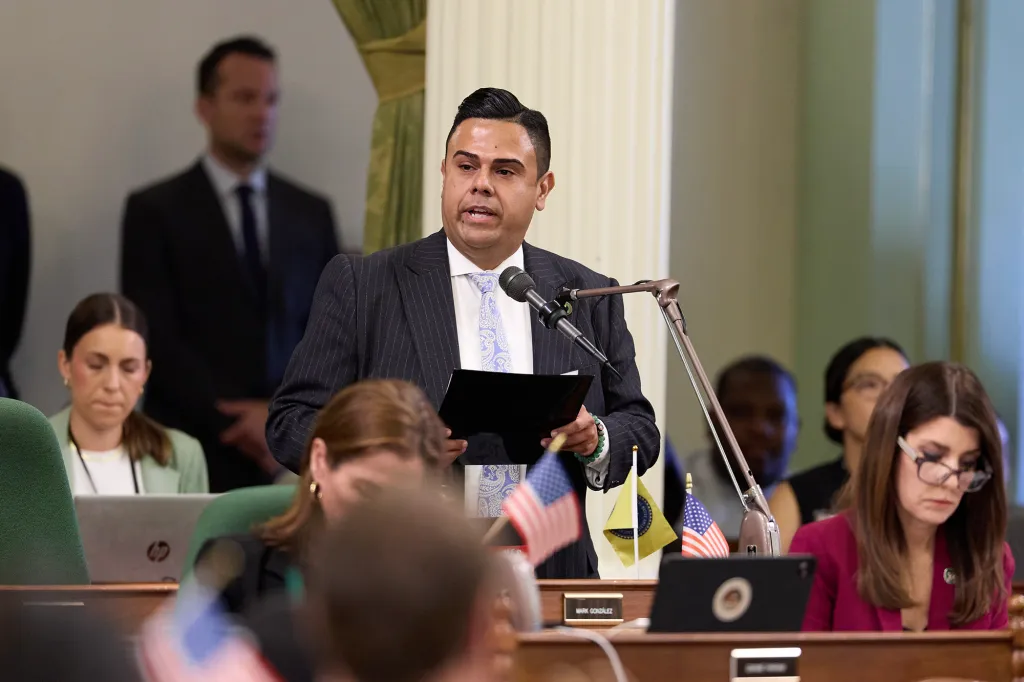
Tickets and Tows
Ordinances that regulate homeless encampments often target people sleeping in tents, not vehicles. As a result, police have used parking ordinances to try to clear vehicle encampments by giving tickets and either towing or threatening to tow. But that approach doesn’t take into account the fact that the cars and RVs are people’s homes.
In some places, new policies that specifically address people living in cars and RVs try to address that problem by providing services as well as tickets and tows.
Gardiner, who watched the city of San Jose tow his home, was luckier than many. The city paid him $2,000 for his RV, as part of a pilot program intended to convince people to give up their vehicles and move indoors. He also got a free hotel room, where the city told him he could stay for up to a year.
Gardiner was one of several hundred people living in San Jose’s largest encampment — a sprawling collection of RVs, cars and tents scattered across a rutted, dirt field in Columbus Park and spilling onto surrounding streets. City crews began clearing the camp in August, and have towed 78 vehicles and moved 128 people indoors, according to the city.
The city estimates 370 people lived at Columbus Park when the operation started, but advocates say it was more. And not everyone has been offered the $2,000 buy-back program, a motel stay or other help.
Valerie Vallejos, who lives in her van at Columbus Park while she studies cosmetology at San Jose City College, said she was visiting her children in Stockton when outreach workers came to the park offering people services. Now she’s trying to get on the list, hoping to get a housing placement or at least a reprieve from threats of towing. So far, she’s had no luck.
“I’m going to keep coming back out until I get something,” she said. “It’s my only option. What else can I do?”
San Jose is cracking down in other places, too. Officials launched a pilot program earlier this year that bans oversized and lived-in vehicles in certain parts of the city. The city first posts signs and puts up flyers warning people to move their vehicles, then tows if people don’t move. Since January, the city has towed 19 RVs and trailers and 45 other vehicles, according to its online dashboard. But many vehicles return after the enforcement blitz. To date, the city has completed enforcement in 38 “tow-away zones,” where there were a total of 1,175 cars and RVs. Ninety days after that enforcement, 671 vehicles had returned to those locations.
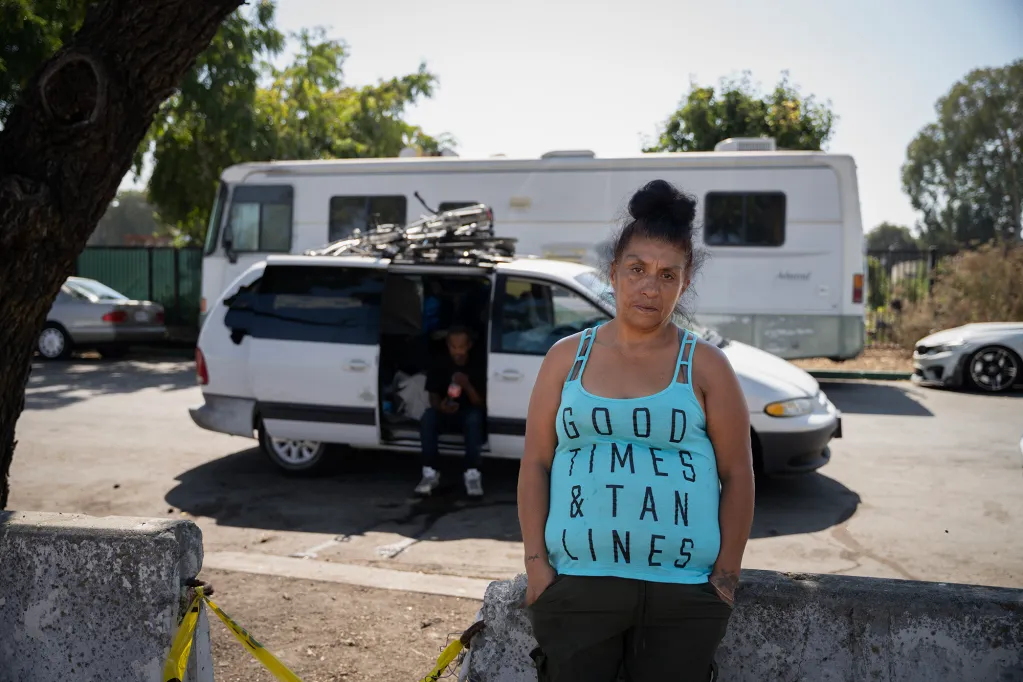
“It’s a start,” said San Jose Mayor Matt Mahan, who acknowledged that towing won’t magically make street homelessness disappear. But he said even forcing RVs to move temporarily can help mitigate the problems the city has seen in long-standing encampments, such as methamphetamine labs, fires and the accumulation of dilapidated, abandoned vehicles.
“This is about providing relief to neighbors and small businesses that have had permanent RV encampments for years on end,” Mahan said.
Since the beginning of the year, San Jose has enforced three “tow-away zones” in the blocks around Barnard Avenue where 51-year-old Esmeralda Herrera lives in a parked trailer with her elderly dog, Kiba. She lost her job as a janitor for the Santa Clara County school district during the COVID-19 pandemic, and then a rent increase drove her out of her apartment.
Herrera is on a waitlist for affordable housing, but she hasn’t seen any progress, she said. In the meantime, Herrera said she bounces all over the city, moving to a new block every time the police threaten to tow her trailer. She’s afraid to leave for job interviews, because she worries that when she gets back, the trailer and her beloved dog will be gone.
“I don’t know what I would do,” she said. “I don’t want to be in the street.”
‘Public road Is Not Permanent Housing’
San Francisco is set to begin enforcing its new RV parking rules this fall. Like San Jose, it plans to pay people to give up their RVs. In addition, people can get a temporary reprieve from towing if they agree to work with a case manager on a housing plan. But only people who have been on the city’s radar since May 2025 are eligible.
“I’m really worried that people are going to end up slipping through the cracks of the permit program, or losing their permit and getting towed,” Binder said. “And for so many people, getting towed means ending up on the streets. That’s my biggest fear: That we’ll see people suffering and more people ending up on the street that weren’t before and don’t have to be.”
In March, Carlsbad expanded its camping ban to include sleeping in vehicles on public property — an infraction that carries a $100 penalty for a first offense, a $200 penalty for a third offense, and a $500 penalty for subsequent offenses. Since the change, the city has issued 34 vehicle camping citations and 77 oversized vehicle parking citations, and towed 12 vehicles, said Mandy Mills, the city’s director of housing and homeless services.
The city received a $3 million state grant to help people living in vehicles move indoors, both by paying for temporary housing subsidies and funding the salaries of two outreach workers to connect people with housing.
In San Mateo, sleeping in a vehicle on public streets has been illegal since the 1990s. But it wasn’t enforced. In June, City Council voted to start giving people tickets after they refused two offers of shelter.
“The public road is not permanent housing,” said City Manager Alex Khojikian.
Gonzalez’s bill was intended to help cities like San Mateo clean up their streets. The bill cleared the Senate Appropriations Committee on Friday with a last-minute amendment that limits its scope to Alameda and Los Angeles counties.
The bill would give cities in those counties more freedom to dispose of abandoned or inoperable RVs. Under current law, a city can trash abandoned RVs valued at $500 or below, but anything more valuable is sold at auction. Someone else can buy that RV and return it to the street, Gonzalez said.
Gonzalez’s bill would raise that threshold to $4,000, allowing cities to more easily junk RVs and get them off the street for good.
While Gonzalez says his legislation wouldn’t target RVs in which people are currently living, the bill doesn’t define what makes a vehicle “abandoned.” Opponents, including the California Public Defenders Association, worry that will allow cities to tow too broadly, and remove much-needed shelter from California’s homeless population.
A separate piece of legislation, Senate Bill 692, would have lowered a different threshold cities have to meet before they can tow “abandoned or inoperable” vehicles. The bill, by Oakland Democratic Sen. Jesse Arreguín, is dead for this year, but may move forward again next year, as Arreguín says he will continue to work with stakeholders on amendments.
In the meantime, in San Jose, Herrera will continue bouncing around the city’s streets with her dog.
“I don’t know what is my next step if they tell me to move, because I’ve been everywhere,” she said, “and I’m not getting anywhere with the homeless programs.”
This article was originally published on CalMatters and was republished under the Creative Commons Attribution-NonCommercial-NoDerivatives license.








